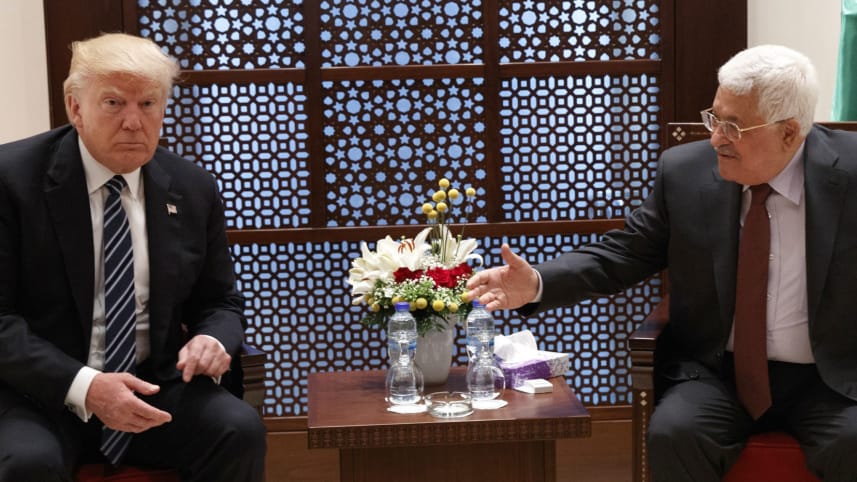Opinion Why Trump and Kushner Will Never Get the Palestinians to the Negotiating Table
جونسن توبين/هآررتس: لهذه الأسباب لن يتمكن ابداً ترامب ومعه كوشنر من اخذ الفلسطينيين إلى طاولة المفاوضات
Jonathan S. Tobin/Haaretz/June 30/18
When the Trump team’s maladroit diplomacy meets the Palestinians’ inexhaustible supply of resentment, the result is combustion. But beyond the regular exchanges of insults, there’s an even deeper and unbridgeable disconnect.
The latest exchange of insults between Jared Kushner and Saeb Erekat is hard to distinguish from the general sound track of foreign policy in the age of Trump.
The tough talk about the Palestinian leadership from the presidential son-in-law/point man on the Middle East is in keeping with President Donald Trump’s style of communication in which foes, rivals and those reluctant to do his bidding are subjected to pressure and abuse.
The furious over-the-top responses from Palestinian Authority negotiator Erekat have been equally Trumpian in their bitterness at both the style and the substance of the U.S. negotiating stance. It’s easy to see the back and forth between these two sides – in the prelude to the expected release of the American peace plan this summer – as just one more example of the Trump team’s maladroit diplomacy and the Palestinians’ seemingly inexhaustible supply of resentment at the slights they feel the world has dumped on them.
But the problem here goes deeper than the fact that Kushner is a diplomatic novice that his father-in-law had no business saddling with the portfolio for Middle East peace, or that Erekat has made a career out of spewing bile and spin about the conflict that are often as false as anything coming out of Trump’s mouth.
The real disconnect between the Americans and the Palestinians right now is primarily a matter of real estate. Or rather, the former’s conception of the Israel-Palestinian conflict as a problem that is little different from the sort of real estate transactions on which all of the Trump team made their livings, before the surprising results of the 2016 presidential election put them in charge of the world’s sole superpower.
For all of the ink that has been spilled lately in trying to analyze the prospects for the Trump peace plan, perhaps the best came in the latest issue of The New Yorker in which Adam Entous devoted several thousand words to examining the efforts of Israel, the Gulf States and Trump to reverse President Obama’s approach to the Middle East.
The article, “Donald Trump’s New World Order,” devotes far too much space to telling us what we all already knew about the tension between Obama and the Netanyahu government as well as the Saudis and the Emirates. Nor was its intricate unraveling of the contacts between the Israelis and Trump prior to the election, with a particular emphasis on Kushner’s role, particularly revelatory.But The New Yorker’s Entous nevertheless mined some real journalistic gold when he got one “senior Trump administration official” to let their hair down and candidly discuss the way the White House thinks about the Palestinians.
One anecdote is particularly telling. Erekat told Kushner that he felt like he was dealing with “real-estate agents” instead of White House officials. Kushner responded: “Saeb, you haven’t made peace with politicians. Maybe you need a real-estate agent.”
When the Palestinians turned down peace deals – that would have given them statehood as well as a share of Jerusalem – from Ehud Barak and Bill Clinton in 2000 and 2001, and then an even more generous offer from Ehud Olmert with the backing of George W. Bush, they believed time was on their side.
Even assuming, as perhaps we shouldn’t, that Yasser Arafat or Mahmoud Abbas would have made peace on any terms, the party line from Ramallah and its foreign apologists has always been that they would never accept anything less than full sovereignty with no Israeli security presence over 100 percent of the West Bank as well as all of the Arab sections of Jerusalem. Moreover, they assumed that eventually the Americans and the rest of the world would force the Israelis to acquiesce to all of their demands.
But that’s not the way the Trump team looks at it.
As far as they are concerned, Israel’s economic and military strength, combined with the declining support for the Palestinians from much of the Arab world – and their focus on Iran, has altered the terms of the conflict.
Trump, Kushner, chief negotiator Jason Greenblatt and Ambassador David Friedman all view the Palestinians as the moral equivalent of a landlord stuck with an overpriced, run-down property that nobody wants.
If they expect to get anything from either the Americans and the Israelis, they’re going to have to take less than they initially hoped, not more. Privately, David Friedman compared the Trump Administration’s approach to structuring a “bankruptcy-type deal” for the Palestinians.
As one Entous interviewee described Kushner’s message to the Palestinians: “If you want to work with us, work with us. If you don’t want to work with us, we’re not going to chase after you.”The Trump team see the Palestinians’ walking away from Barak and Olmert’s offers as akin to missing out on a chance to buy Google stock 20 years ago. Much as they would like to get that bargain price they might have had before, if they want independence, they will need to pay a lot more for it now.
That’s why Kushner’s deal entails a state that is likely to be demilitarized and burdened with Israeli security provisions that will limit its sovereignty. Just as bad for Abbas, the U.S. deal envisions a Palestinian capital in the suburb of Abu Dis, and not East Jerusalem.
Though the Saudis have reportedly already repeatedly urged Abbas to accept what Trump will offer, the Palestinians have made it clear they regard this deal as an insult. Having turned down sweeter bargains in the past, they see no reason to end the conflict for the crumbs the Americans have put on the table.
Part of the reason for this is political. With Hamas disingenuously reviving interest in the right of return, Abbas knows he and Fatah couldn’t possibly survive if they ended 100 years of war with Zionism for so little in return, especially with respect to the fate of the descendants of the 1948 refugees. Moreover, they see their demands as absolute and rooted in justice, not assets to be traded in a real estate transaction.
That sounds principled. But, though Kushner’s criticisms of Abbas and the P.A. were undiplomatic, they were very much on target. Spewing anti-Semitism, attacking Israel’s legitimacy and subsidizing terrorists has undermined support for the peace camp in Israel.
More to the point, Abbas wasted Obama’s presidency. Obama was more sympathetic to the Palestinians and more inclined to pressure Israel than any of his predecessors, yet Abbas never even met him halfway and actually undermined his efforts with feints toward unity with Hamas and futile forays at the United Nations. Abbas squandered that opportunity and the abandonment of the Palestinians by their Arab allies means his position really is that of a bankrupt. All of which means that if the Palestinians do want a state of any kind they’re going to have to swallow their pride and deal with Kushner.
Of course, that won’t happen.
Because the Palestinians are right about one thing: The conflict with Zionism has never been about real estate or drawing lines on a map. After a century of Palestinians contesting Israel’s right to be there, it’s not clear Abbas has the will or the ability to accept a state on any terms, let alone the discounted ones Trump has put on the table. That means Trump’s “ultimate deal” is, as Erekat has promised, dead on arrival.
But the sad truth for the Palestinians is that rather than their refusal being a stepping stone to more pressure on Israel for better terms, the value of what they are likely to be offered in the future is going down, not up.
A firesale-for-a-state deal might seem a humiliation that can never be accepted. But it is likely to be the best one available to them for the foreseeable future.



















